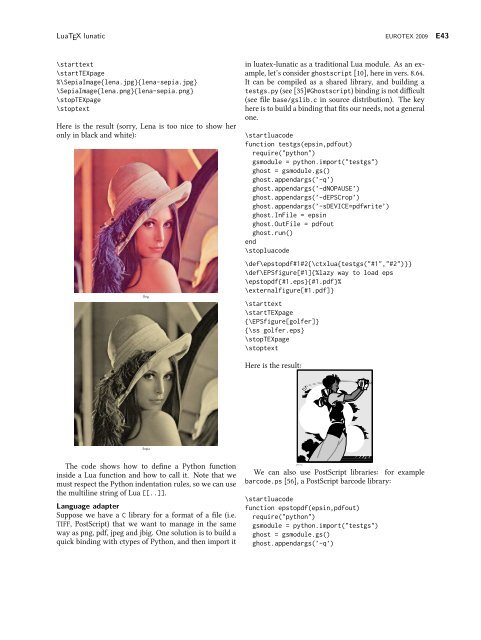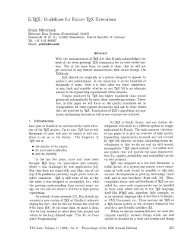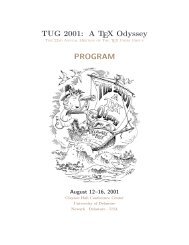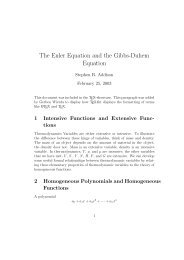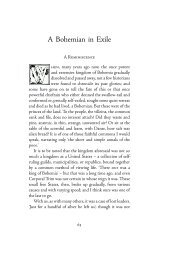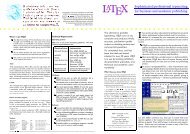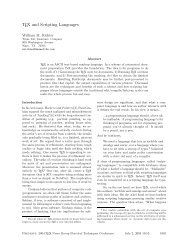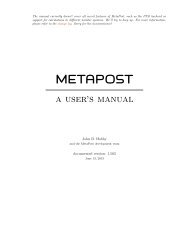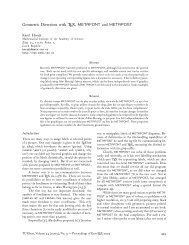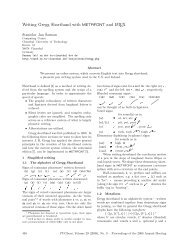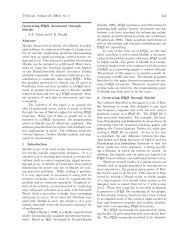Complete issue 30:3 as one pdf - TUG
Complete issue 30:3 as one pdf - TUG
Complete issue 30:3 as one pdf - TUG
You also want an ePaper? Increase the reach of your titles
YUMPU automatically turns print PDFs into web optimized ePapers that Google loves.
LuaTEX lunatic EUROTEX 2009 E43<br />
\starttext<br />
\startTEXpage<br />
%\SepiaImage{lena.jpg}{lena-sepia.jpg}<br />
\SepiaImage{lena.png}{lena-sepia.png}<br />
\stopTEXpage<br />
\stoptext<br />
Here is the result (sorry, Lena is too nice to show her<br />
onlyinblackandwhite):<br />
Orig.<br />
Sepia<br />
The code shows how to dene a Python function<br />
inside a Lua function and how to call it. Note that we<br />
mustrespectthePythonindentationrules,sowecanuse<br />
the multilinestring ofLua [[..]].<br />
Language adapter<br />
Suppose we have a C library for a format of a le (i.e.<br />
TIFF, PostScript) that we want to manage in the same<br />
way<strong>as</strong>png,<strong>pdf</strong>,jpegandjbig. Onesolutionistobuilda<br />
quick binding with ctypes of Python, and then import it<br />
in luatex-lunatic <strong>as</strong> a traditional Lua module. As an example,let’sconsiderghostscript[10],hereinvers.8.64.<br />
It can be compiled <strong>as</strong> a shared library, and building a<br />
testgs.py(see[35]#Ghostscript)bindingisnotdicult<br />
(see le b<strong>as</strong>e/gslib.c in source distribution). The key<br />
hereistobuildabindingthattsourneeds,notageneral<br />
<strong>one</strong>.<br />
\startluacode<br />
function testgs(epsin,<strong>pdf</strong>out)<br />
require("python")<br />
gsmodule = python.import("testgs")<br />
ghost = gsmodule.gs()<br />
ghost.appendargs(’-q’)<br />
ghost.appendargs(’-dNOPAUSE’)<br />
ghost.appendargs(’-dEPSCrop’)<br />
ghost.appendargs(’-sDEVICE=<strong>pdf</strong>write’)<br />
ghost.InFile = epsin<br />
ghost.OutFile = <strong>pdf</strong>out<br />
ghost.run()<br />
end<br />
\stopluacode<br />
\def\epsto<strong>pdf</strong>#1#2{\ctxlua{testgs("#1","#2")}}<br />
\def\EPSfigure[#1]{%lazy way to load eps<br />
\epsto<strong>pdf</strong>{#1.eps}{#1.<strong>pdf</strong>}%<br />
\externalfigure[#1.<strong>pdf</strong>]}<br />
\starttext<br />
\startTEXpage<br />
{\EPSfigure[golfer]}<br />
{\ss golfer.eps}<br />
\stopTEXpage<br />
\stoptext<br />
Here isthe result:<br />
golfer.eps<br />
We can also use PostScript libraries: for example<br />
barcode.ps [56], aPostScriptbarcode library:<br />
\startluacode<br />
function epsto<strong>pdf</strong>(epsin,<strong>pdf</strong>out)<br />
require("python")<br />
gsmodule = python.import("testgs")<br />
ghost = gsmodule.gs()<br />
ghost.appendargs(’-q’)


